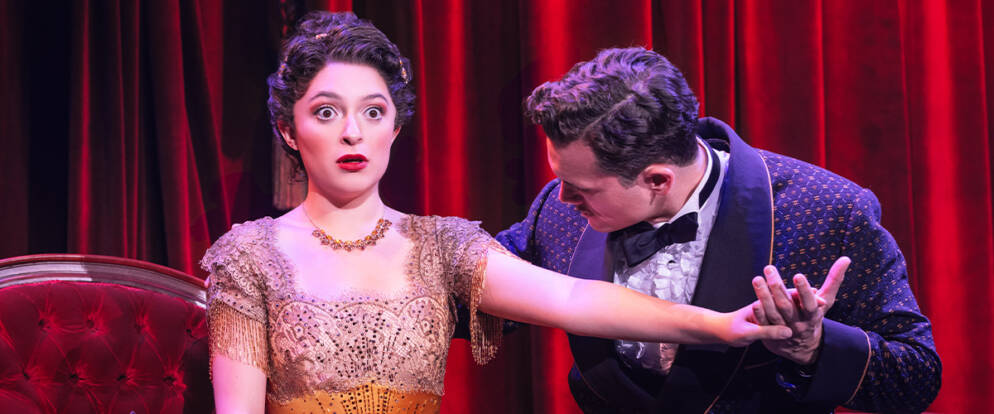Caterina McCrimmon and Steven Mark Lucas in “Funny Girl.” Photo courtesy of Ensemble Arts Philly.
Steven Silver
“Funny Girl” may be the most Jewish Broadway musical after “Fiddler on the Roof,” and like “Fiddler,” it premiered on Broadway 60 years ago, in 1964.
The “Funny Girl” touring production is heading to Philadelphia in July, but not many people know that the show played in Philadelphia before arriving on the Great White Way.
The musical is set primarily in the 1920s and follows Jewish comedian Fanny Brice and her career and tumultuous marriage to her second husband, Nicky Arnstein. The original Broadway musical was produced by Brice and Arnstein’s son-in-law, Ray Stark, and the music was composed by British Jewish composer Jule Styne.
The show’s journey to the stage was long and complicated: at one point Stephen Sondheim was approached to compose the music, but reportedly insisted that a Jewish actor play Brice.
The production ultimately awarded the role of Jewish Fanny to Barbra Streisand, who became synonymous with the role and songs such as “Don’t Rain on My Parade,” “I’m the Greatest Star” and “People,” which she continued to perform in concerts and on albums for decades to come.
According to the Barbra Archives, the show’s first regional run was in Boston in January and February 1964, with two performances in Philadelphia. The show ran at the Forest Theatre from February 4 to 22, then moved to the old Erlanger Theatre (at the corner of 21st and Market Streets) from February 24 to March 7, before making its New York premiere on March 26.
During previews the show underwent significant changes, including the return of Jerome Robbins, a legendary Jewish Broadway figure, as director of the “Funny Girl” company in Philadelphia.
The show was a success and ran on Broadway for over three years, but never won a Tony Award, despite being nominated eight times.
From left: Melissa Manchester and Caterina McCrimmon. Photo courtesy of Ensemble Arts Philly.
A 1968 film adaptation of Funny Girl, directed by German-Jewish director William Wyler, again starred Streisand in her film debut, and Omar Sharif played Arnstein in a role that was controversial on both the Arab and Israeli sides, especially as the Six-Day War broke out during the film’s production.
“You think Cairo was mad? Look at the letter I got from my Aunt Rose!” Streisand famously said. (She names each of her aunts differently in the story.)
Although she didn’t win a Tony, Streisand did win her first Oscar for her role in Funny Girl.
A sequel, Funny Lady, was made in 1975, focusing on Brice’s later marriage, with Streisand starring opposite Jewish actor James Caan, again directed by a Jewish director (Herbert Ross) and this time with music written by Jewish duo John Kander and Fred Ebb (best known for Cabaret).
In a chapter called “How Jews Became Sexy” in his book Performing Jewish: Negotiating Ethnicity on Stage and Screen, Henry Vial writes about how Streisand’s rise as a movie star and sex symbol in the late 1960s and early 1970s influenced cultural perceptions of Jewish women, a theme that is revisited in Paul Thomas Anderson’s 2021 film Licorice Pizza.
Streisand speaks extensively of the different versions of “Funny Girl” in her 2023 memoir, “My Name is Barbra.”
“Obviously, we were both Jewish and born in New York City; she grew up on the Lower East Side, so we had similar speech rhythms,” Streisand wrote in her memoir of how she became interested in the role. “I realized that I was often laughed at when I spoke in that distinctively Jewish Brooklyn accent I’d heard growing up. We both had Jewish mothers who worried about food and about our marriages, although not necessarily in that order.”
“Funny Girl” tour company.
Photo courtesy of Ensemble Arts Philly
While Funny Girl hasn’t been revived on Broadway for decades, it has continued to be performed around the world, occasionally toured, and had its first major production in Israel in 2016.
In spring 2022, “Funny Girl” finally returns to Broadway with a revised script by Jewish playwright Harvey Fierstein, and another Jewish actress, Beanie Feldstein, has been cast in the role of Fanny Brice.
However, the show received negative reviews, and rumors circulated that Feldstein would replace Fanny with actress Lea Michele. Although Michele is not Jewish, her character Rachel Berry on Glee is Jewish, and the series featured a storyline in which Rachel was trying to star in a Broadway revival of Funny Girl. Another Jewish actress, Tovah Feldshuh, was cast as Bryce’s mother, replacing former Glee star Jane Lynch.
The Broadway show closed in September, but a national tour based on the play is currently underway and is scheduled to arrive in Philadelphia in July. And while the suburban tryout 60 years ago took place at the still-standing Forrest Theatre, the production will run from July 16 to 28 at the Academy of Music.
The show is hosted by Ensemble Arts Philly, the Kimmel Center’s new “presenting brand.”
Caterina McCrimmon stars as Fanny Brice on the tour. McCrimmon is a Florida native of Cuban-American descent.
“I’ve been fighting my whole life to get to this point. As an actor and as the daughter of a teacher, growing up outside Miami, I didn’t have the resources that other kids in New York have. So I’ve been fighting my whole life. And that’s Fanny. I relate to her tenacity in putting herself out there unashamedly,” the actress said in an interview with 48 Hills during production in San Francisco.
Veteran actress Melissa Manchester, who comes from a Jewish family in New York, plays Mrs. Brice.
Steven Silver is a freelance writer living in Broomall.

